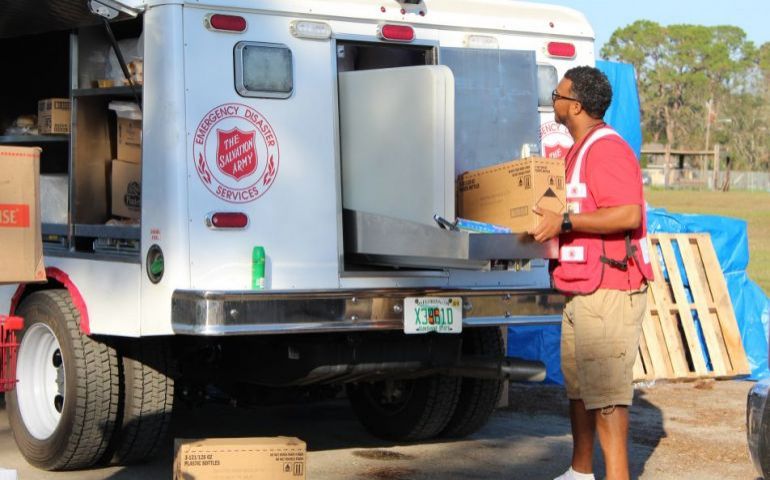News Articles

NOV
A Day of Emergency Disaster Operations in Apalachicola
Apalachicola, FL (November 2, 2018) - The Salvation Army began aiding disaster survivors after a hurricane hit Galveston, TX in September 1900. Officers (the clergy of The Salvation Army) from across the country moved into the Galveston area to feed and shelter thousands of survivors, while also providing much needed emotional and spiritual support.
This calling continues today and within hours of Hurricane Michael’s landfall on October 10, The Salvation Army began offering emergency disaster services. After major disasters, incident management teams are assigned to help manage the response. The Salvation Army uses the Incident Command System (ICS), a standardized approach to the command, control, and coordination of emergency response allowing responders from multiple agencies and non-governmental organizations to be effective. Incident Commander, Major David Robinson states “Every time one serves in disaster, it is different circumstances and a different experience. Although we are serving in a tragic situation, this has been one of the best experiences I have had as an Incident Commander. The people of the Florida panhandle are resilient, strong, and show a tremendous amount of faith in the middle of devastation.”
The Apalachicola Incident Management Team (IMT) is responsible for serving parts of Bay County, Calhoun, Franklin, Liberty and Gulf counties. The team is currently overseeing feeding operations as well as distributing other items such as clean-up kits, tarps, and toiletry items. To date, the team has served over 102,000 hot meals, 38,600 drinks and 71,000 snacks. Emotional and Spiritual Care specialists have reached 11,434 survivors. Over 2,800 food boxes and over 2,900 cases of water have been distributed so far.
A typical day at The Salvation Army’s Apalachicola base camp begins with a meeting of all members of the IMT to plan operations for the day. Canteen (mobile feeding unit) and emotional and spiritual care personnel are gathered to provide service locations, safety procedures, devotions, and any other pertinent information is disseminated. After the meeting, canteens are loaded with meals as well as all necessary items to serve survivors and first responders. Supply trucks are unloaded, logistics are organized, and plans are made as the liaison officer hears from partners such as local emergency managers, county and municipal authorities. As canteen crews arrive back at the end of a day, insulated containers (used to keep food at the proper temperature for safe serving) and canteens are cleaned, and preparations are made for the next day.
It takes a great deal of personnel to handle all the details of a disaster response operation, including logistics, operations, planning and finance as well as administration, and more. The logistics chief obtains and manages all resources and equipment necessary. The operations chief manages all direct services to survivors. The planning chief collects and evaluates information related to the disaster operation to share with the incident commander so informed decisions can be made. The finance and administration chief takes care of all personnel, statistics, and finances. The incident commander is the on-site manager of the operation.
One of the most important aspects of The Salvation Army’s disaster work is the emotional and spiritual care officer. They are responsible for managing spiritual and emotional support services. This support includes care for disaster survivors, rescue workers, and the public as well as internal care for staff and volunteers working the operation.
First Baptist Church of St. George Island is currently providing on-site accommodations to The Salvation Army allowing much needed operations and services to occur which is vital to the success of the Army's response. The Salvation Army is grateful for the gift of comfort and hospitality. It is the community partnerships created allowing organizations like the Army to be there before, during and after disasters.
The full operation involves hundreds of volunteers, staff and officers of The Salvation Army. Each day is a new day, adjusted to the ever-changing needs of those served and carried out in His name without discrimination. In Apalachicola, the days begin with Psalm 118:24-26 (King James version) “This is the day which the Lord hath made; we will rejoice and be glad in it.”
For the latest in food service locations for this area, please visit salvationarmyflorida.org/response.



